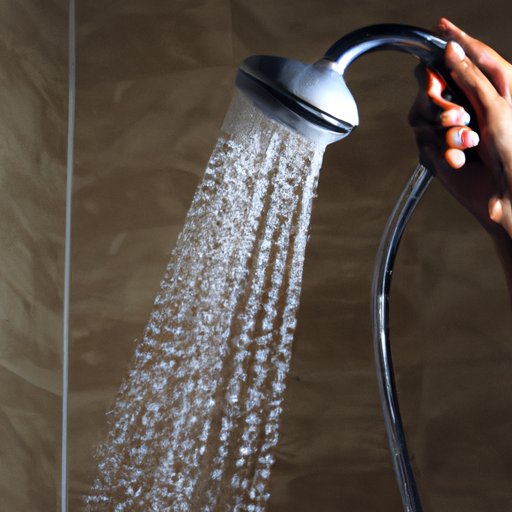
Introduction
Showering is a common part of most people’s daily routine. It not only helps us feel clean and refreshed but also plays a significant role in maintaining good personal hygiene. However, many people wonder how often they should shower to maintain optimum health and cleanliness. In this article, we explore this topic in greater depth and provide helpful tips for establishing healthy showering habits.
Personal hygiene and showering habits: How often is too often?
Personal hygiene habits vary widely between individuals. While some people prefer to shower every day for maximum cleanliness, others may choose to shower less frequently due to their lifestyle or personal preferences. However, showering too often can be harmful to the skin and hair. Frequent showers can strip the skin of its natural oils, potentially leading to dryness, irritation, and inflammation. Additionally, excessive showering can damage the hair, causing it to become dull and brittle.
So how often should you shower? The answer may vary depending on your skin and hair type, as well as your overall health and lifestyle. Generally speaking, experts recommend showering no more than once a day, especially if you have dry or sensitive skin. However, if you have an active lifestyle or work outdoors, you may need to shower more frequently to remove sweat and dirt from your body.
The science of showering: How many showers a day is reasonable for good health?
Showering not only keeps us clean but also helps promote good health. A warm shower can help relax sore muscles, improve circulation, and boost the immune system. However, excessive showering can also have negative health effects. For example, hot showers can raise body temperature, potentially leading to fainting or dehydration.
So how many showers a day does the average person need for good health? According to dermatologists, showering once a day is sufficient for most people. However, if you have a skin condition such as eczema or psoriasis, you may want to speak with your doctor about how often to shower. Additionally, if you sweat heavily or are exposed to dirt and pollution on a regular basis, you may need to shower more frequently.
When showering, it is important to use a gentle soap or body wash. Avoid using hot water and keep your shower time to around 10-15 minutes. Pat your skin dry with a towel rather than rubbing it, and apply moisturizer to keep skin hydrated and healthy.
Debunking common myths about showering: Are daily showers really necessary?
One of the most common myths about showering is that daily showers are essential for good hygiene. However, this is not always the case. Daily showers can be beneficial for people with active lifestyles or oily skin, but for others, they may be unnecessary and even harmful.
For example, people with dry or sensitive skin may benefit from showering less frequently to preserve the skin’s natural oils. Likewise, people who live in dry or cold climates may need to shower less frequently to avoid over-drying their skin.
There are also alternatives to daily showers that can help keep you clean and fresh. Dry shampoo and baby wipes are a great option for people who want to freshen up without showering. Additionally, wearing clean clothes and practicing good oral hygiene can also help maintain overall cleanliness.
Conserving water and energy: How reducing your daily shower routine benefits the environment?
Showering too frequently not only has negative health effects but also impacts the environment. In many parts of the world, water is a precious resource, and excessive water consumption can have severe consequences for the environment.
The average shower uses around 2-5 gallons of water per minute. If you take a 10-minute shower every day, that adds up to 70 gallons of water per week. By reducing your shower time by just a few minutes or showering every other day, you can significantly reduce your water consumption and help conserve this valuable resource.
To conserve water and energy while showering, try turning off the water while you shampoo or soap up, and install a low-flow showerhead. Consider taking shorter, cooler showers, and avoid running the water while brushing your teeth or shaving. These small changes can add up to significant water and energy savings over time.
Tips for establishing healthy showering habits: How to determine how often you should shower every day?
Establishing healthy showering habits involves finding a routine that works for your lifestyle and personal preferences. To determine how often you should shower, consider your skin and hair type, as well as your level of physical activity. If you sweat heavily or are exposed to dirt or pollution on a regular basis, you may need to shower more frequently. However, if you have dry or sensitive skin, you may benefit from showering less often.
Other tips for maintaining good hygiene without showering too frequently include wearing clean clothes, practicing good oral hygiene, and using dry shampoo or baby wipes in between showers. Additionally, avoid using harsh soaps or body washes, and moisturize your skin regularly to keep it healthy and hydrated.
Conclusion
In conclusion, showering is an essential part of maintaining good personal hygiene and health. However, excessive showering can be harmful to the skin and hair and have negative impacts on the environment. By establishing healthy showering habits, you can maintain cleanliness and good hygiene without compromising your health or the environment.
Remember to shower no more than once a day, use gentle soaps and body washes, and keep your showers short and sweet. Additionally, try to conserve water and energy by installing low-flow showerheads and reducing your shower time.
By following these tips, you can establish healthy showering habits that benefit both you and the environment.





